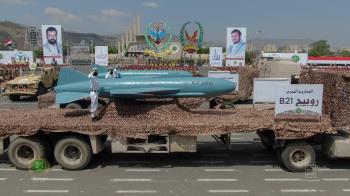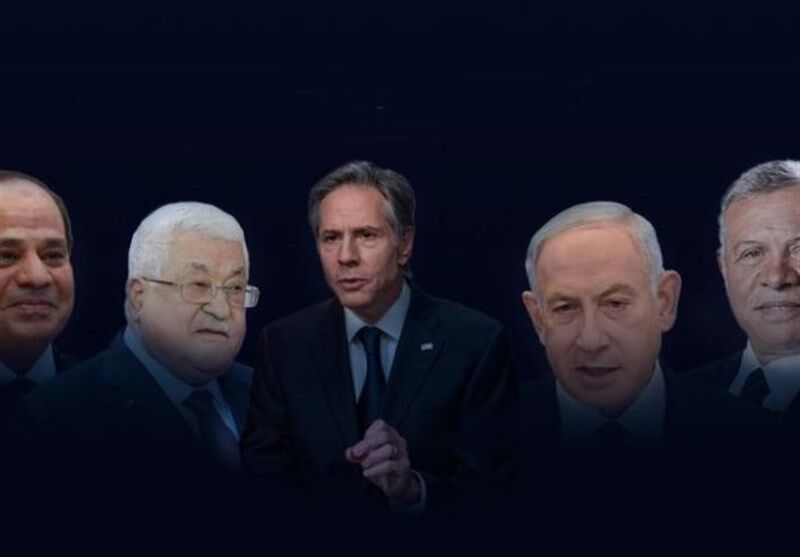Alwaght- Whereas the Palestinian groups have warned they will not commit to any compromise deal with the Israeli regime and continue the armed struggle as the only way to liberate their occupied lands, the US insists on keeping alive the compromise process with obviously fruitless meetings. On the eve of the holy month of Ramadan, which has always borne many developments in the occupied territories, Washington is struggling to buy security for the Israelis.
To this end, Egypt’s Sharm El-Sheikh on Sunday hosted a five-party meeting gathering together the high-ranking political and security officials of Egypt, the Palestinian Authority (PA), Israeli regime, Jordan, and the US. Spokesman of the Egyptian Foreign Ministry Ahmed Abu Zeid said that this meeting was held in line with the efforts to consolidate the stability, calm the situation, and defuse tensions between the Israelis and Palestinians.
Some sources with knowledge of the matter maintained that bilateral meetings between the participants of this meeting were going to be held at the request of the US, with the main purpose actually saving the Israeli regime and strengthening the security cooperation of PA and Tel Aviv. These sources further said that meetings between Palestinian and American officials have been held in Ramallah in recent days, and the Americans tried to persuade the Palestinian side to participate in the meeting in Sharm El-Sheikh. Some analysts believe that one of the most important goals of holding Egypt summit, indeed with American insistence and pressure, is the exit of the Israelis from isolation, which has intensified in the past three months with hardline new government of Prime Minister Benjamin Netanyahu.
The meetings come as far-right Israeli cabinet since its assumption of power approved controversial plans including expansion of settlement projects, Palestinian prisoner execution law, and arming the settlers, something infuriating the resistance groups and even Western countries supporting PA-Israeli peace.
Sequel to failed Aqaba summit
The Sharm El-Sheikh summit followed a similar summit hosted by Jordan in the city of Aqaba aimed at de-escalating the tensions between the sides, but failed to make any difference. A few days after the summit, tensions flared up again with an attack by hundreds of settlers in the Palestinian town of Huwara in Nablus.
At the meeting in Aqaba, it was agreed to stop the unilateral actions of the Israeli regime against the Palestinian people for a limited period, as well as to stop settlement construction and hold another meeting in Sharm El-Sheikh. According to the latest agreement, Tel Aviv promised to stop advancing construction of settlements for 4 months and approving new settlements for 6 months. The Palestinian officials believe that the Israeli regime has not complied with these terms of the agreement, especially the one related to the cessation of attacks on Palestinian cities, and there is no guarantee it will remain committed to the agreement in Sharm El-Sheikh, especially that the leaders of Tel Aviv before the meeting had emphasized that their policies towards the Palestinians will not change and they will continue their assassination operations targeting Palestinian resistance commanders.
The hard-line ministers of the Israeli cabinet, including Minister of Internal Security Itamar Ben-Gvir and Minister of Finance Bezalel Smotrich, demand the annihilation of the Palestinians and push to annex the West Bank to the occupied territories with their controversial plans. The presence of these extremists on top of the Israeli government not only did not guarantee the security of the settlers, but also made the occupied territories even more insecure. The warmongering policies of these figures in the West Bank has even drew reaction from the leaders of the Israeli opposition who warned about their security measures.
None of the past agreements between the PA and the Israelis carried positive outcomes, not even short-lived peace between the Israeli regime and the Palestinian groups. The Sharm El-Sheikh meeting in the current situation is a diplomatic show on the part of the US, which has not made tangible results due to the opposition of the Palestinians. The US diplomatic moves come in conditions that these days the occupied territories are facing a wide wave of political and security instability, and Israeli leaders are warning about a civil war and collapse from within. Although Washington officials disagree with Netanyahu government, they consider it their duty to protect the Israeli existence and try to reduce the threats posed by the Palestinian resistance groups as much as possible, as they know involvement of Israelis in both internal and external fronts will immerse Tel Aviv in deeper crises.
Odds are clashes between the Israeli occupation forces and the Palestinians intensify in Ramadan, and since the security forces and even army disobey Netanyahu, new clashes would work against Tel Aviv, and this is extremely worrying to Washington that seeks to motivate PA President Mahmoud Abbas to restore security and intelligence cooperation. The PA had earlier proven its loyal service to Tel Aviv arresting and handing over to the Israelis top Hamas officials in the West Bank. It also pushed to curb anti-Israeli operations launched by resistance groups, demonstrating that it makes a good ally to Washington and Tel Aviv.
Despite several times vowing to cut off cooperation and negotiations with the Israelis, Abbas has shown that he still has the potentials to restore cooperation with the Israelis in order to solve the PA financial problems and solidify his shaky position in the Palestinian developments. This motivates the White House officials to take advantage of the PA to disarm the resistance forces in the West Bank and prevent armed operations during the month of Ramadan. But the US is committed to the PA to advance its plans while this administration has no significant position among the Palestinian groups, and even some of its intelligence and security forces have defected in the past year and joined the resistance groups.
Several-decade US movements
In all of the meetings Washington arranged between the Israelis and the Palestinians in the past four decades, the US’s central aim was protection of the Israeli security and it never took any moves in the interest of the Palestinians. And now, too, it is seeking to persuade the PA for cooperation to grant the Israeli occupation legitimacy in the West Bank.
In 1978, with the Camp David agreement, the US made Egypt the first Arab country to normalize relations with the Israeli regime in order to tell to the world that the Arab supporters of Palestine recognized the existence of Israel that is just fighting for its so-called promised land.
As a continuation to its mediations, the US brokered Oslo Accords in 1993, the first deal between Tel Aviv and the Palestinian Liberation Organization (PLO). The Oslo agreement was an attempt to set up a certain framework that would lead to a complete settlement of the conflict, but after three decades of this agreement, none of its terms have been implemented and remained ink on the paper. The Israeli radicals have clearly expressed their opposition to the two-state solution, and this means that any agreement with the occupiers is doomed to failure, and holding meetings like Aqaba and Sharm El-Sheikh is only waste of time that will only perpetuate the Israeli occupation.
The second American initiative for reconciliation was the Annapolis Conference, held in November 2007. In the meeting, formation of an independent Palestinian state and the recognition of the Israeli regime by some Arab countries were the central agenda. Jordan, Egypt, Saudi Arabia, Syria, Lebanon, and Qatar were among the invitees to this conference, but due to serious differences between the PA and Tel Aviv over the implementation time of the agreements between, the meeting ultimately failed.
None of these agreements contained mention of total cessation of the Israeli occupation in the West Bank and Gaza Strip, showing that they were biased to Israeli interests.
Palestinian reactions
Considering the PA compromise deals with the Israelis invalid and obsolete, the resistance groups this time, too, criticized Abbas for negotiations with Tel Aviv. Hamas, Islamic Jihad, and Popular Front for the Liberation of Palestine in a statement said: “The team that is going to participate in this meeting is separate from the national will of the Palestinian people and is not considered their representative, and this is a coup against the will of the Palestinian people and departure from the national consensus.... The Zionist enemy is using these security meetings to step up its aggression and crimes against the Palestinian nation, as it recently committed another crime in Jenin and assassinated a number of resistance fighters.”
These groups asked the PA to put aside the “illusion” of peace and negotiations with the enemy and commit to the popular will and the national consensus and warned about “grave enemy plots” against the Palestinian people and nation. They continued that the PA participation in Sharm El-Sheikh negotiations worked like a “grab rope” to the collapsing Netanyahu and his far-right cabinet. The PA participation in this meeting gives the Knesset an opportunity to advance the law on the execution of Palestinian prisoners, and this meeting is an attempt by the US to break isolation Netanyahu’s cabinet suffering from.
These fruitless meetings even drew reactions from the PA leaders themselves, to an extent that Fatah movement, led by Abbas, reacted to the PA decision to participate in Sharm El-Sheikh summit, saying that like its predecessor in Aqaba, this meeting would be a failed one.
Washington’s arrangement of Egypt meeting comes while Iran and Saudi Arabia last week resumed their ties after seven years of tensions and other Arab states said they are willing to take similar steps, causing concerns to the Americans. Because Iranian-Saudi agreement means suspension of the Israeli-Arab normalization process and throws Tel Aviv back in isolation. Therefore, the Americans are trying to undermine the West Bank-based resistance groups in association with the PA and eliminate the shadow of war from the occupied territories.



























